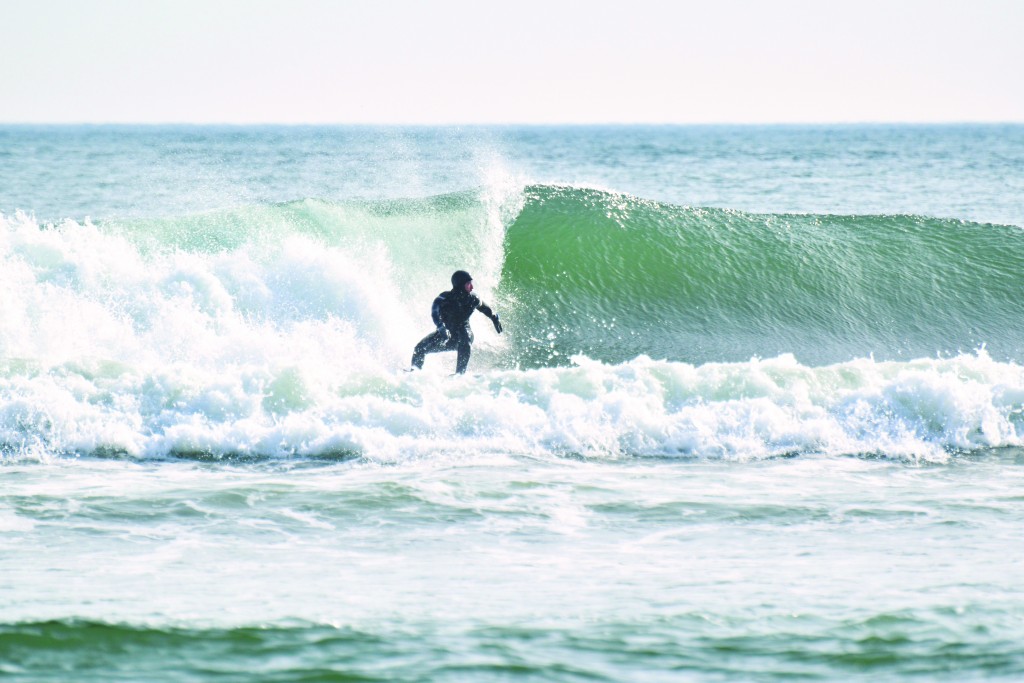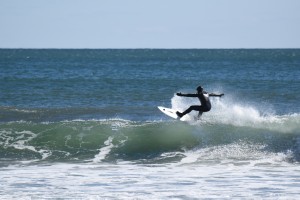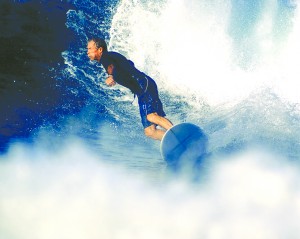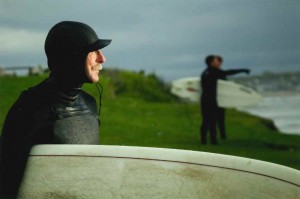 The sands of time are shifting in Rhode Island, and not just metaphorically. Coastal erosion is a problem in the Ocean State, with the impact of climate change and the lack of replenishment of lost materials making for an uncertain future. Brian Caccioppoli is a researcher in marine geology and coastal geology at the University of Rhode Island (URI) Graduate School of Oceanography. He is also an avid surfer. Along with fellow boarder Dr. Richard C. Rhodes III of URI’s Department of Fisheries, Animal and Veterinary Sciences, these two surfing scientists conduct research into sea levels, climate change and coastal erosion, all while catching those big waves.
The sands of time are shifting in Rhode Island, and not just metaphorically. Coastal erosion is a problem in the Ocean State, with the impact of climate change and the lack of replenishment of lost materials making for an uncertain future. Brian Caccioppoli is a researcher in marine geology and coastal geology at the University of Rhode Island (URI) Graduate School of Oceanography. He is also an avid surfer. Along with fellow boarder Dr. Richard C. Rhodes III of URI’s Department of Fisheries, Animal and Veterinary Sciences, these two surfing scientists conduct research into sea levels, climate change and coastal erosion, all while catching those big waves.
Amadeus Finlay (Motif): What inspired you to use wave studies to discuss the environment?
Brian Caccioppoli: I work for John King, a professor of oceanography at URI, who teaches courses in geological oceanography and has research interests in climate change, environmental studies and paleomagnetism. Much of our work involves the use of mapping technologies. These technologies allow us to map the sea floor and shoreline, and when done so as part of a monitoring program, allows us to understand how the sea floor and shoreline are responding to environmental changes, such as sea level rise and strong storms.
Richard Rhodes: Both Brian and I are surfers. My background is in reproductive endocrinology and my interest has been in domestic livestock. I recently took a position in which I represent colleges of agriculture in the northeast. And not surprisingly, climate change and the effects on agriculture are extremely important topics as we build strategies to ensure resiliency and address change.
AF: How did the surfing scientists project evolve? 
RR: Climate Central was interested in our perspectives about sea level rise from a scientific perspective (a vocational view) along with an ocean user/lover perspective (avocation view). Brian and I were able to couple our knowledge of the environment, climate change and sea level rise with our love of surfing. So, Climate Central did a video (youtu.be/bFYzvIas6gA) that incorporated the views of a geoscientist (Brian) and someone in agriculture (me).
AF: Why Rhode Island?
BC: Rhode Island has a thriving surf community of year-round dedicated surfers. Although it may not seem like a surfing destination, Rhode Island offers a wide variety of surfing breaks, from sand-bottom beaches to cobblestone reefs. Its south facing exposure to the Atlantic Ocean positions it well to pick up waves from storms throughout the year, including distant hurricanes, powerful nor’easters and frontal systems. The varying orientations of the surf breaks mean that on almost any given swell, there are favorable wind conditions to be found, grooming the storm’s waves into “clean,” rideable swells.
The variety of surf breaks along Rhode Island’s shoreline attracts visitors from all over the east coast, and some from even more distant places. Although the consistency cannot compare to California, the quality and size of the waves can truly be world class. With such a strong surf community and culture, many surfers have themselves become amateur oceanographers, always paying attention to what the tide, swell and winds are doing on any given day.
AF: What were your key discoveries/takeaways?
RR: The ocean is rising and our coastline is under persistent remodeling. Brian and I can both attest to the dramatic changes in our beaches and our shoreline; we’ve both personally witnessed that. And we’re not going to stop that in the near future. But to adapt, we must take steps to ensure coastal resiliency. That’s going to require good science (read: support science funding) and sound policy-making (read: policy that is driven by data and informed by sound, university-based science.)
BC: Rhode Island, like all other coastlines of the world, is vulnerable to climate change and sea level rise. Climate scientists have projected global sea level to rise by at least several feet by the end of the century. Some places in the world, however, are expected to experience potentially enhanced rates of sea level rise, and Rhode Island is one of those localities. More powerful and frequent storms are also predicted due to climate change, which will likely increase the rate of erosion along Rhode Island’s shoreline.
AF: What can our readers to do to support your project, as well as natural conservancy as a whole?
 RR: Support experts and listen to experts. Don’t cherry-pick facts and seek information that supports your view on a topic, challenge or problem. For those of us who are scientists, it’s imperative that we listen, that we engender trust and that we effectively engage our communities to help them understand what we are doing and why.
RR: Support experts and listen to experts. Don’t cherry-pick facts and seek information that supports your view on a topic, challenge or problem. For those of us who are scientists, it’s imperative that we listen, that we engender trust and that we effectively engage our communities to help them understand what we are doing and why.
BC: Like so many things in life, knowledge is power! Our best chances of mitigating the impacts will be to implement scientifically sound management strategies, and foster a collaborative environment among policymakers, scientists and community members. The more educated we are about the challenges that climate change and sea level rise pose, the more empowered we become to come up with solutions to these problems. Making small, daily changes to reduce our carbon footprint and making climate change a voting issue are great steps that everyone can implement. Supporting political candidates who make climate change a central issue can lead to legislation that seeks to mitigate climate change.